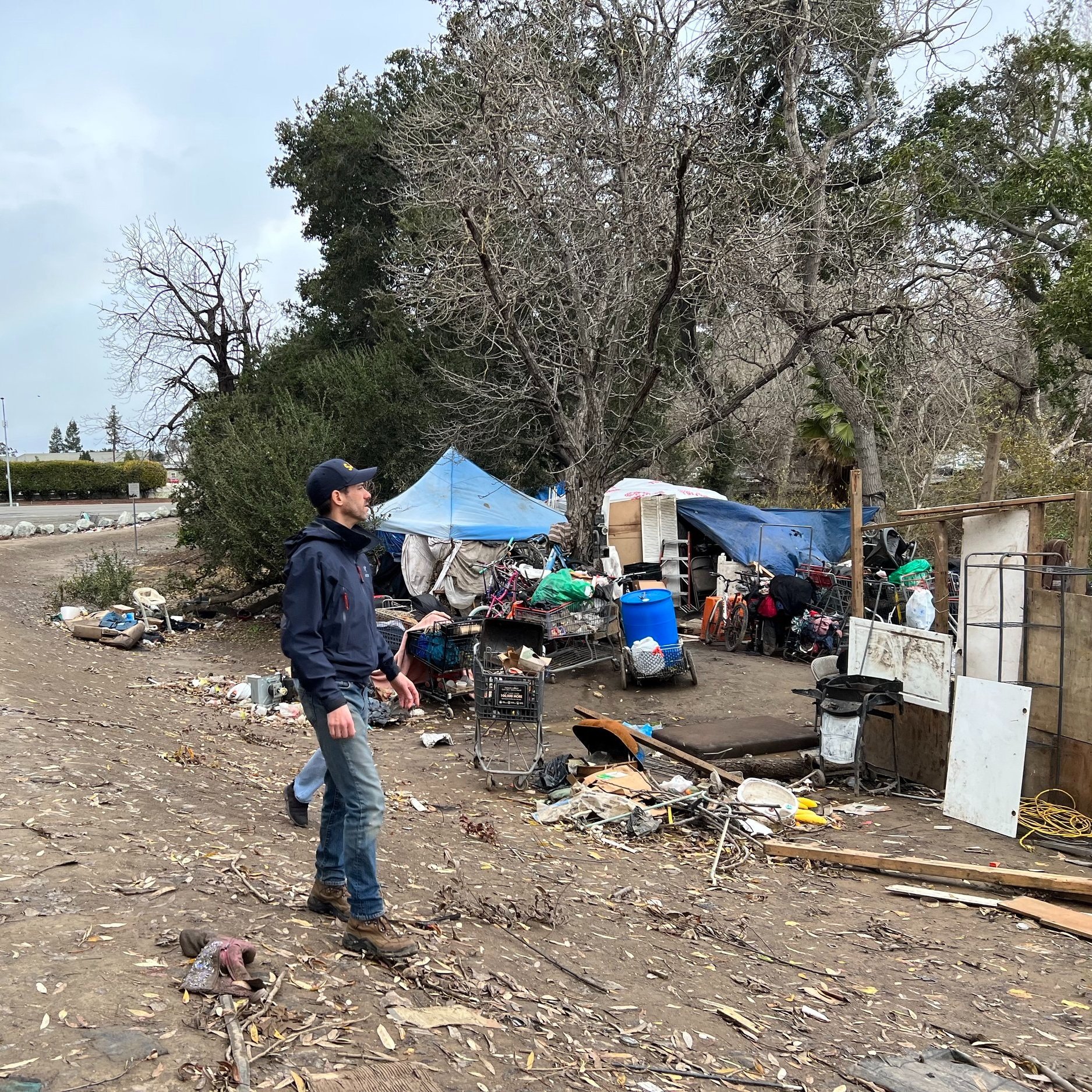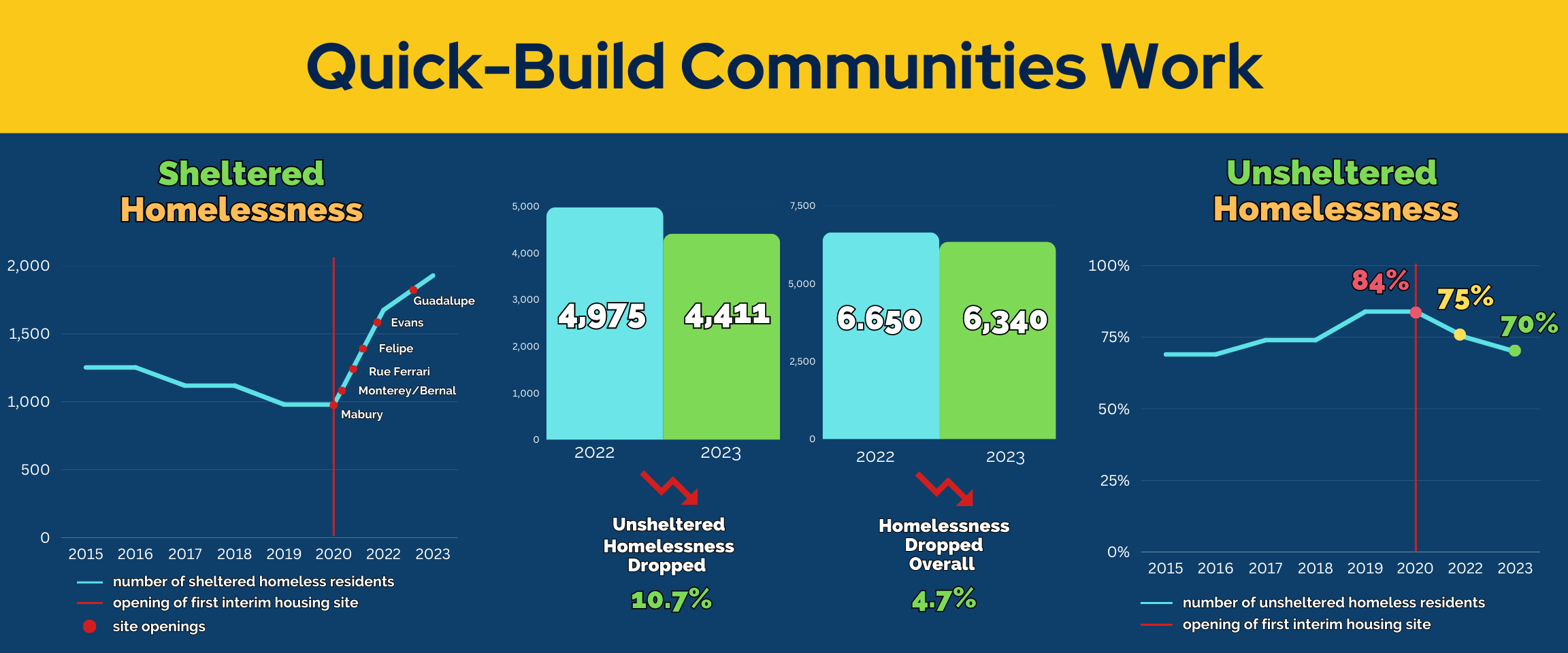Ending the Era of Encampments
MAYOR MATT IS BRINGING URGENCY to one of San Jose’s most pressing problems — street homelessness. His plan focuses on proven, scaleable, and cost-effective ways to transition people out of our streets, creeks, and parks and into safe, dignified housing.
The first step is expanding our strategies to provide housing at a fraction of the cost and a fraction of the time needed to build traditional apartments. Right now, housing for the homeless is costing over $1 million per door and taking 5+ years to build. While long-term affordable housing is the ultimate goal, failing to offer interim solutions in the meantime is literally killing our unhoused residents and harming our entire community. Just last year, 246 unhoused people died on our streets. Our vulnerable neighbors can’t wait any longer. Research shows that the longer people languish on the streets, the harder it gets to get them back on a path towards self-sufficiency. We need faster, less expensive routes to reduce human suffering.
And our emergency interim housing (EIH) or “Quick-Build” Communities are proving to be the immediate solution we need. The 2023 homelessness census found that our population of unsheltered neighbors dropped by more than 10%. This is only the second time in almost 10 years that we’ve made progress toward ending our era of encampments; and it corresponds almost perfectly with our expansion of Quick-Build Communities.
We know we need to challenge the status quo solution and move toward solutions with more immediate impacts. Which is why Mayor Matt has challenged City Hall to create 1,000 new interim placements as alternatives to tent encampments and lived-in vehicles this year. We need to use every tool available to us – from Quick-Build Communities, safe parking and treatment centers, to new affordable housing.
We have a collective responsibility for providing safe, indoor spaces for our most vulnerable neighbors, and everyone has a responsibility for living indoors when the option exists. When we offer a private room with individual bathrooms and supportive services onsite, like what is available at most of the City’s Quick-Build Communities, data shows the vast majority of people will accept a placement. In addition, data shows that on average across five sites that have been operating more than a year, calls for police, fire, graffiti, and illegal dumping services went down. In short, Quick-Build Communities have proven to make good neighbors and benefit entire neighborhoods.
Mayor Matt is prioritizing our Quick-Build Communities because he believes we have a moral imperative to address the greatest human suffering first – which is that of the people living on our streets and in our creeks with no access to bathrooms or running water. But providing interim solutions now does not mean San Jose is turning away from our commitment to long-term affordable housing. We are simply adding the missing rung on the housing ladder – providing safe spaces for neighbors to stay and access services while they wait the 5+ years it takes to build more permanent solutions.
We know that a major contributor to our homelessness crisis is a shortage of housing. In the South Bay, we’ve added roughly 6 jobs for every home we've built over the last decade. This means that more people are chasing after the same limited supply of housing – driving up the price and displacing vulnerable low-income people who end up doubling or tripling up with other families, moving out of the region, or falling into homelessness.
A hurdle we face is that it is incredibly slow and expensive to build housing in the Bay Area. First and foremost, Mayor Matt believes that we must reduce the cost of construction, reduce fees and streamline permitting so that we can build housing faster and more cost-effectively where it makes sense, such as Downtown and along transit corridors across our region.
Making it easier to build market rate housing is the best way to increase the volume of housing we are creating – and every resident who rents or buys a new market rate units is one more person not bidding up the price of existing housing – but it’s also true that, on its own, the market won’t build enough housing that is sufficiently affordable to most working people. Therefore, the public sector will continue to have a critically important role to play in incentivizing the construction of housing that is affordable to people at all income levels that exist within our city. In San Jose, we’ve worked hard to fund this subsidized housing – with the passage of Measure A and Measure E, and the Council’s adoption of an inclusionary housing ordinance and commercial linkage fee. Reducing timelines and construction costs will help us stretch these dollars further.
It is also important to acknowledge that California’s housing supply shortage far exceeds San Jose’s capacity to solve. We need the state and federal government to reassume more of the responsibility for ending our housing crisis and ensure that every city is doing its fair share. Mayor Matt will continue to advocate for regional, state and federal dollars to help make San Jose more affordable for all of us.
Beyond short and long-term solutions that provide housing for our homeless neighbors, we need to invest in services that help people turn their lives around – starting with mental illnesses and severe addiction that has gone untreated for far too long. Up to 42% of homeless people in San Jose suffer from mental health conditions, according to our most recent homeless census. To address these profound challenges, Mayor Matt supports legislation authored by Senator Eggman (SB 43) that helps loved ones, first responders and concerned bystanders get people experiencing profound psychiatric disorders or substance abuse issues into secure care settings. He has also called on the City Manager to explore partnerships with Santa Clara County to expand mental health treatment facilities as part of a comprehensive approach to homelessness. While all Behavioral Health Services fall under the County’s jurisdiction – the Mayor is asking the City to help the County scale up these life-saving services along the entire continuum of need, from outpatient counseling to custodial care.
SELF-REPORTED HEALTH CONDITIONS
Current health conditions that may affect the housing stability or employment of those experiencing homelessness:
Finally, Mayor Matt has championed programs like San Jose Bridge that give homeless individuals opportunities to work, learn and achieve greater self-sufficiency. SJ Bridge pays homeless individuals an hourly wage to clean up the city while also enrolling them in a job training module related to one of many career options. As participants complete their training, the program provides job placement services. Over the past year, SJ Bridge participants collectively took over 350,000 pounds of trash off of our streets and over one-third of program participants graduated into permanent jobs.
UNSHELTERED HOMELESSNESS IS ONE OF OUR TOUGHEST CORE CHALLENGES — but it is solvable if we focus on scaling common sense solutions that get people off the streets in several months as opposed to several years.








